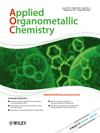
APPLIED ORGANOMETALLIC CHEMISTRY
Scope & Guideline
Fostering scholarly debate in the vibrant world of organometallics.
Introduction
Aims and Scopes
- Catalysis and Reaction Mechanisms:
The journal extensively covers the development and optimization of organometallic catalysts for various organic transformations, including coupling reactions, hydrogenation, and oxidation processes. Research often emphasizes mechanistic insights and the role of metal centers in catalysis. - Biological Applications:
There is a significant focus on the biological activities of organometallic compounds, including their potential as anticancer agents, antimicrobial agents, and their interactions with biomolecules. Studies often involve in vitro and in vivo evaluations. - Materials Science and Nanotechnology:
The journal highlights the synthesis and characterization of organometallic materials for applications in electronics, photonics, and environmental remediation. This includes the design of nanocomposites and metal-organic frameworks (MOFs) for catalysis and sensing. - Environmental Chemistry:
Research on the use of organometallic compounds for environmental applications, such as pollutant degradation and heavy metal ion removal, is prevalent. The journal encourages studies that address sustainability and green chemistry. - Theoretical and Computational Studies:
Many articles incorporate theoretical approaches, including density functional theory (DFT) calculations, to support experimental findings and provide insights into the electronic structure and reactivity of organometallic complexes.
Trending and Emerging
- Green Chemistry and Sustainability:
There is an increasing emphasis on environmentally friendly synthesis methods and the use of organometallic compounds in sustainable applications, such as waste remediation and renewable energy technologies. - Nanomaterials and Hybrid Systems:
Research on nanostructured organometallic materials and their composites is on the rise. This includes the development of hybrid systems that combine organometallic compounds with polymers or other nanomaterials for enhanced catalytic performance. - Biologically Active Organometallics:
The exploration of organometallic compounds as potential therapeutic agents, particularly in cancer treatment and antimicrobial applications, is gaining momentum. This reflects a broader trend towards drug discovery and biomedical applications. - Catalyst Recycling and Efficiency:
Studies focusing on the recyclability of organometallic catalysts and the development of efficient catalytic systems are trending. This includes research on magnetic nanoparticles and supported catalysts that can be easily recovered after use. - Interdisciplinary Approaches:
There is a notable trend towards interdisciplinary research that combines organometallic chemistry with fields such as materials science, environmental science, and biochemistry, leading to innovative applications and broader impacts.
Declining or Waning
- Traditional Organometallic Synthesis:
There seems to be a reduction in articles focused solely on traditional synthetic methods for organometallic compounds without further applications or novel modifications. Researchers are increasingly integrating synthetic work with applications rather than presenting standalone synthesis studies. - Purely Theoretical Studies:
The journal has seen a decrease in purely theoretical studies that do not accompany experimental validation. There is a growing preference for research that combines theoretical insights with practical applications in catalysis or materials science. - Inorganic Organometallic Compounds:
Research focusing on inorganic organometallic complexes, particularly those with limited biological or catalytic applications, appears to be less frequent. The journal is shifting towards studies that reveal functional properties and innovative applications instead.
Similar Journals

BIOINORGANIC CHEMISTRY AND APPLICATIONS
Innovating solutions through interdisciplinary research.BIOINORGANIC CHEMISTRY AND APPLICATIONS, published by HINDAWI LTD, is a distinguished journal dedicated to advancing the field of bioinorganic chemistry, offering an open access platform since 2008. With an ISSN of 1565-3633 and E-ISSN of 1687-479X, this journal provides a global forum for researchers, practitioners, and scholars in the vibrant fields of Biochemistry, Inorganic Chemistry, and Organic Chemistry. Recognized for its scholarly impact, it holds an impressive Q2 rank in Biochemistry and Q1 ranks in both Inorganic and Organic Chemistry in the 2023 metrics. Catering to a diverse audience, the journal emphasizes the importance of interdisciplinary research and the application of inorganic chemistry in biological systems. With an accessible range of articles aimed at fostering scientific dialogue and innovation, BIOINORGANIC CHEMISTRY AND APPLICATIONS plays a crucial role in shaping future research and application in the chemical sciences.
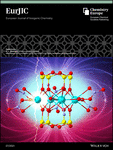
EUROPEAN JOURNAL OF INORGANIC CHEMISTRY
Exploring the Frontiers of Inorganic ChemistryThe EUROPEAN JOURNAL OF INORGANIC CHEMISTRY, published by WILEY-V C H VERLAG GMBH, is a premier peer-reviewed journal dedicated to advancing the field of inorganic chemistry. With an ISSN of 1434-1948 and an E-ISSN of 1099-0682, this journal has established itself as a key platform for the dissemination of innovative research, reviews, and features since its inception. As of 2023, it holds a respectable Q2 quartile ranking in the domain of inorganic chemistry, reflecting its influence and contribution to the scientific community—ranking #33 out of 79 in Scopus’ assessment and placing the journal in the 58th percentile. The journal encompasses a wide range of topics within inorganic chemistry, making it a valuable resource for researchers, professionals, and students alike. Although the journal does not currently offer open access, it remains an essential outlet for high-quality, impactful studies in inorganic chemistry, showcasing significant advancements and fostering collaboration among scholars globally.

Inorganic and Nano-Metal Chemistry
Pioneering Research in Inorganic Chemistry for a Sustainable Future.Inorganic and Nano-Metal Chemistry is a premier journal published by Taylor & Francis Inc, focusing on innovative research and advancements in the fields of inorganic chemistry and nano-metal applications. With an increasing impact in the academic community, this journal has established itself within the Q3 category of both Inorganic Chemistry and Physical and Theoretical Chemistry as of 2023, reflecting its global recognition and influence. The journal is accessible as an Open Access publication, ensuring that research findings are freely available to a broad audience, promoting transparency and collaboration in scientific exploration. Based in the United Kingdom, Inorganic and Nano-Metal Chemistry aims to disseminate high-quality peer-reviewed articles that not only highlight fundamental studies but also push the boundaries of technological applications in areas such as catalysis, materials science, and nanotechnology. Researchers, professionals, and students will find this journal an invaluable resource for the latest developments and interdisciplinary insights in the ever-evolving landscape of inorganic and nano-metal chemistry.
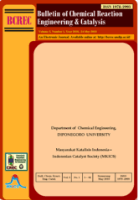
Bulletin of Chemical Reaction Engineering and Catalysis
Showcasing Transformative Insights in Chemical Reaction EngineeringBulletin of Chemical Reaction Engineering and Catalysis is a distinguished open-access journal published by UNIV DIPONEGORO, focusing on pivotal advancements in the fields of chemical reaction engineering and catalysis. Since its inception in 2008, this journal has served as a vital platform for disseminating cutting-edge research, catering to a diverse readership that includes researchers, professionals, and students in chemical engineering and related disciplines. With its dedication to publishing valuable insights, the journal has been indexed in Scopus and boasts respectable rankings across various categories, including Q3 in Chemical Engineering (miscellaneous) and Q4 in Catalysis as of 2023. It continues to foster scholarly dialogue and collaboration by providing an accessible means for contributors to share their findings. Operating from Semarang, Indonesia, this journal underscores its commitment to advancing knowledge in chemical sciences, making it an essential resource for those engaged in the study and application of chemical processes.
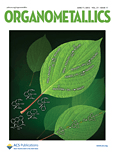
ORGANOMETALLICS
Pioneering Research in Organometallic ChemistryORGANOMETALLICS is a prestigious journal published by the American Chemical Society, specializing in the multidisciplinary field of organometallic chemistry. With an impressive history spanning from 1982 to 2024, this journal has established itself as a critical resource in the scientific community, holding a distinguished Q1 ranking in Inorganic Chemistry and Q2 rankings in both Organic Chemistry and Physical and Theoretical Chemistry for 2023. The journal's robust impact factor reflects its significance, ranking among the top-tier publications in its category; for instance, it ranks 27th out of 79 in Inorganic Chemistry. Researchers and professionals in the field eagerly contribute their findings, ensuring the journal remains at the forefront of contemporary chemical research. Although ORGANOMETALLICS does not currently offer open access options, it provides an essential forum for innovative research, discussions, and advancements in organometallic science. Its commitment to excellence makes it an invaluable resource for researchers, professionals, and students dedicated to exploring the rich interplay between metals and organic compounds.

DOKLADY CHEMISTRY
Elevating the discourse in diverse chemistry realms.DOKLADY CHEMISTRY is an esteemed academic journal published by MAIK NAUKA/INTERPERIODICA/SPRINGER, focusing on the dynamic field of chemistry. Established in 1996, this journal serves as a significant platform for disseminating cutting-edge research, reviews, and significant developments in various areas of chemistry, including but not limited to general and miscellaneous chemistry. Currently indexed with an ISSN of 0012-5008 and E-ISSN of 1608-3113, DOKLADY CHEMISTRY maintains a commitment to academic rigor and integrity, contributing critical insights to the scientific community. Despite its Q4 ranking in the 2023 Chemistry category and a Scopus rank of #314 out of 408, this journal remains an important resource for researchers, professionals, and students eager to explore emerging trends and innovative methodologies in the field. The journal operates under a model that supports comprehensive scholarly communication, making it a key fixture among established chemistry publications.
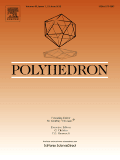
POLYHEDRON
Catalyzing Ideas in Inorganic and Materials Science.POLYHEDRON is a prestigious academic journal published by Pergamon-Elsevier Science Ltd, specializing in the fields of Inorganic Chemistry, Materials Chemistry, and Physical and Theoretical Chemistry. With its ISSN 0277-5387 and E-ISSN 1873-3719, the journal has been a significant outlet for groundbreaking research since its inception in 1982 and continues to be influential for scholars and practitioners. As of 2023, it holds a Q3 quartile ranking across its categorization, underscoring its impact within the scientific community with respectable Scopus Rankings that place it in the top percentiles of relevant fields. Situated in the United Kingdom, POLYHEDRON aims to foster the exchange of innovative ideas and findings related to polyhedral molecules and structures, making it an essential resource for researchers seeking to expand their knowledge and contribute to these dynamic areas of study. While currently not an Open Access journal, it remains committed to advancing education and research by providing quality content that serves both academic and practical applications.
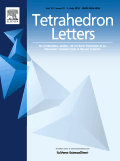
TETRAHEDRON LETTERS
Exploring the Nexus of Drug Discovery and ResearchTETRAHEDRON LETTERS, published by Pergamon-Elsevier Science Ltd, is a leading journal in the fields of Biochemistry, Drug Discovery, and Organic Chemistry, with a rich legacy since its inception in 1959. This prestigious journal serves as a vital resource for researchers and professionals dedicated to advancing the understanding of chemical sciences, featuring high-impact research that influences both academic and practical applications. Although it is currently classified in the third quartile across its categories for 2023, its rigorous peer-review process ensures the publication of quality research that contributes to the scientific community. With an ISSN of 0040-4039 and an E-ISSN of 1873-3581, TETRAHEDRON LETTERS is easily accessible for those in the academic landscape seeking to stay abreast of innovative developments. Researchers, professionals, and students alike will find invaluable insights and collaborative opportunities within the pages of TETRAHEDRON LETTERS, making it an essential read for anyone involved in the chemical sciences.

JOURNAL OF STRUCTURAL CHEMISTRY
Elevating Standards in Peer-Reviewed Chemical ResearchThe JOURNAL OF STRUCTURAL CHEMISTRY, published by PLEIADES PUBLISHING INC, is a premier resource in the fields of Inorganic Chemistry, Materials Chemistry, and Physical and Theoretical Chemistry. Established in 1960, this journal has been providing a platform for groundbreaking research, facilitating the advancement of knowledge and innovation up to the year 2024. With an ISSN of 0022-4766 and an E-ISSN of 1573-8779, this journal strives to maintain high academic standards, as evidenced by its quartile rankings in 2023, where it ranks Q4 across various chemistry categories. While it currently does not offer open access, the journal's insightful articles are crucial for professionals and students seeking to enhance their understanding and expertise in structural chemistry. Subscribers can expect a comprehensive collection of peer-reviewed research, empirical findings, and theoretical discussions that contribute significantly to the scientific community. With its strong historical foundation and ongoing commitment to quality, the JOURNAL OF STRUCTURAL CHEMISTRY continues to be an essential resource for those passionate about the complexities of structural chemistry.

REVIEWS IN INORGANIC CHEMISTRY
Navigating Trends and Challenges in Inorganic ScienceREVIEWS IN INORGANIC CHEMISTRY, published by Walter de Gruyter GmbH, is a distinguished academic journal that serves as a vital resource for researchers, professionals, and students within the field of inorganic chemistry. With its ISSN 0193-4929 and E-ISSN 2191-0227, this journal has made a significant impact on the discipline, holding a commendable Q2 ranking in the 2023 category of Inorganic Chemistry, placing it in the 81st percentile among its peers according to Scopus rankings. Continuously published since its inception, with converged years spanning from 1985 to 1990 and 1992 to 2024, it features comprehensive reviews encompassing the latest advancements, methodologies, and theoretical frameworks in the subject. Researchers will find IDEAL insights and valuable discussions that keep them abreast of trends and challenges in the domain, essential for driving innovation and collaboration. The journal’s commitment to quality and rigorous peer review highlights its importance in advancing inorganic chemistry research, making it an indispensable tool for academic excellence.